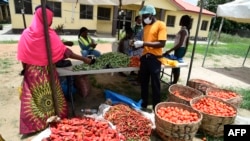The World Health Organization, the Africa Centers for Disease Control and Prevention, and the World Economic Forum have issued guidelines for African countries looking to reopen their economies after weeks of lockdown due to the coronavirus. Health authorities are concerned that opening up too quickly could trigger a fresh wave of COVID-19 cases on the continent.
With the coronavirus having thrown many African economies into a deep freeze, many governments are facing pressure to end lockdowns and travel restrictions so people can get back to work.
But health experts say any country planning to reopen for business needs to do so gradually and based on science-based reasoning.
In a new report, the WHO, Africa CDC, World Economic Forum and Vital Strategies, an organization that helps governments strengthen their public health systems, say governments should first open up vital sectors of their economies and only when the data show it is safe to do so.
They say the key figures to watch are the number of coronavirus cases, the extent of testing, and whether any outbreaks are accelerating.
Matshidiso Moeti, the World Health Organization regional director for Africa, said in a video conference that authorities have to balance economic concerns with consideration of public health.
“The economic impact of the pandemic is going to be great anyway and the measures are merely sharpening and making life worse on the most vulnerable populations. So there needs to be a combination of gradually releasing, analyzing the most critical economic activities that are to continue, including in some countries, agriculture. We’ve been very concerned about the lockdowns and the impact on agriculture for the future, not only for now,” Matshidiso said.
Many Africans remain anxious about the near future. People in 20 African countries were surveyed for the report. John Nkengasong, director of the Africa CDC, said the report showed that 44 percent of respondents said they felt they were at “high personal risk” to contract COVID-19, while nearly 70 percent of people acknowledged that food and water would be a problem if they were required to remain at home for two weeks.
Nkengasong had this advice for Nigeria as it looks to open up again.
“They should continue to expand and strengthen their public health system, especially their testing capacity and not just in the major cities of Lagos and Abuja, but all through the entire country. That way they will be able to pick up cases as they emerge, isolate them and trace their contacts. That is the only way we can be sure to continue to function while maintaining a good public health handle on the situation in the country,” he said.
Nkengasong said the report made three key recommendations to governments across Africa.
First, while case loads are low, build up public health systems to test, trace, isolate and treat cases. Second, monitor data on how public health and social distancing measures affect the spread of the virus. And, last, convince communities to adapt health measures so that people’s livelihoods can be protected.




